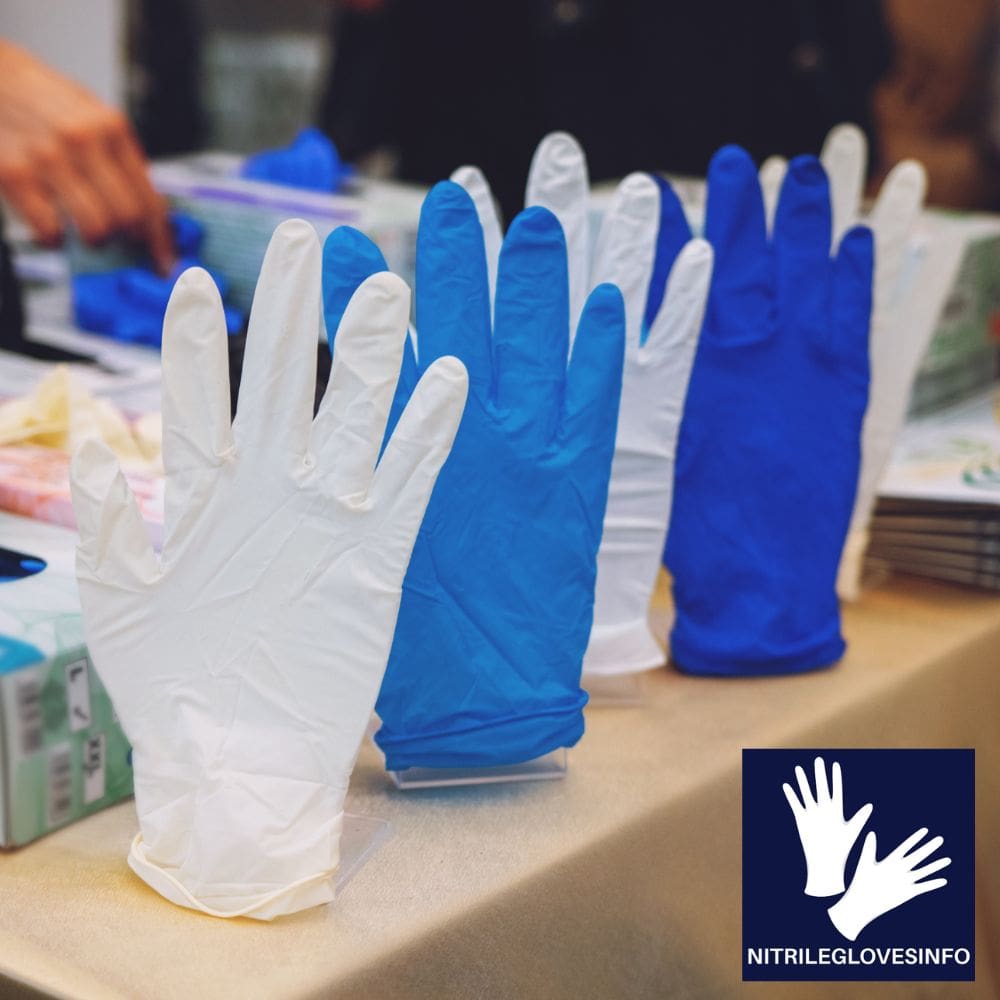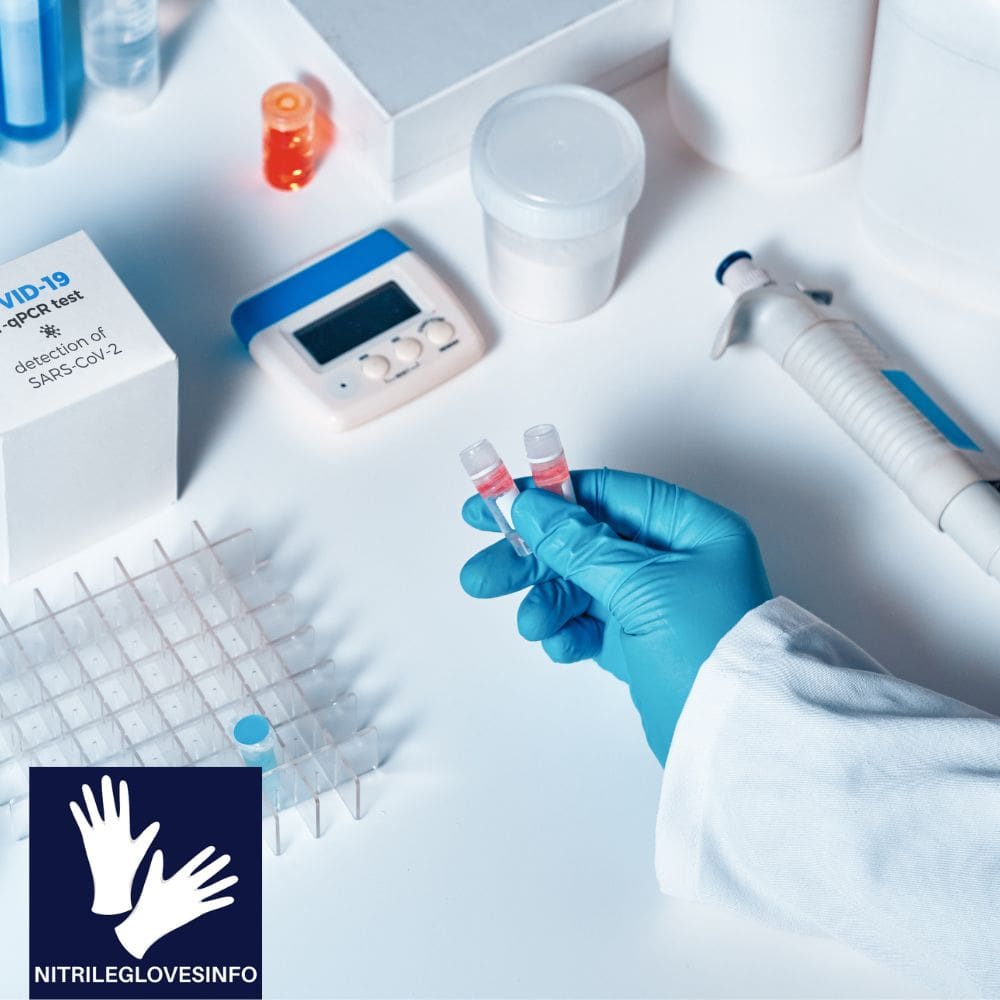Nitrile gloves are commonly used and are one of the most versatile pieces of safety equipment you can own. This blog post is about the five most popular uses for nitrile gloves in daily life.
Table of Contents
- What are nitrile gloves?
- Nitrile Gloves VS Latex Gloves : Allergy Problems
- Nitrile Gloves vs. Vinyl Gloves
- The benefits of nitrile gloves compared to others
- What are disposable nitrile gloves ( nitrile exam gloves)?
- Powered VS Powder-Free Gloves
- 5 Uses for nitrile gloves
- Medical gloves Use
- Food Processing/Food Service
- Cleaning
- Painting
- manufacturing
These protective gloves are perfect for a variety of tasks, from hazardous work to handling food. So whether you’re looking to protect your hands while working in a hazardous environment or just want to stay safe when cooking, read on for tips on how to use them to your advantage.
Disposable nitrile gloves
They are the kind of gloves that you would need to wear if you are an individual who is involved in tasks that are likely to get you in contact with fluids and other types of materials that can be dangerous and may lead to your getting injured or getting your hands or other parts of your body contaminated. They are affordable and can be bought by just about anybody, but it is always better if you were to know more about them and the kinds of benefits that are associated with them before you actually go ahead and purchase them.
What are nitrile gloves?
Nitrile gloves are made from nitrile butadiene rubber, NBR, and synthetic materials. They are tear and puncture resistant and chemical resistant. The nitrile rubber is resistant to common chemicals found in the lab, including acids, bases, and solvents. So, they are general-purpose gloves.
They offer superior dexterity and comfort to wearers. They also provide superior puncture resistance, chemical resistance, and protection against chemicals, cuts, and abrasions. They are available in a variety of sizes to fit any wearer, and they are also available in a variety of colors.
They can protect your hands from germs and bacteria and are great for protecting your hands from harmful chemicals and viruses. They can be used for a variety of purposes, such as protecting your hands from infection or staining.
Latex vs. Vinyl vs. Nitrile
There are three main types of rubber; each has its own unique properties and uses. All of them are powder free but gloves are made of different materials. Some gloves are made from synthetic but some are made from natural latex. You can see the difference between nitrile and the others. Then you can make a decision on which situation and idea to switch to nitrile gloves .
Nitrile Gloves VS Latex Gloves : Allergy Problems
Nitrile and latex gloves have their own pros and cons that make them better or worse for different tasks. Here’s a quick rundown of the differences between both.
Nitrile gloves provide more durability but less flexibility. So they’re not ideal for delicate work. They are able to offer various benefits over latex ones, such as a long shelf life, less friction, and puncture resistance. They also offer good tactile sensitivity. However, they don’t cause allergic to latex reaction, and they’re better for working with dangerous chemicals.
Latex rubber gloves, on the other hand, are more flexible and thus better for delicate work. But they cause an allergic reaction. They’re not as good for working with dangerous chemicals.
Wearing nitrile gloves also offers various benefits over those made from latex, such as a long shelf life, less friction, and puncture resistance.
Nitrile Gloves vs. Vinyl Gloves
Both glove materials are made from synthetic rubber (latex free) and have their own benefits and drawbacks. The gloves are latex protein free, which means that the material doesn’t contain the proteins that can cause latex allergies.
Nitrile gloves offer better resistance to punctures and chemicals. They’re also less likely to cause allergic reactions. They are the best for people with sensitive skin. However, they are more expensive.
Vinyl disposable gloves are specifically made from synthetic PVC, which is a type of plastic. They’re cheaper than nitrile gloves and are good for short-term use, but they’re not good for food prep. PVC is also not considered to be a very eco-friendly material.
Nitrile Rubber Gloves

The benefits of nitrile gloves compared to others
Nitrile gloves are more durable than others. They are more puncture-resistant and also better at preventing chemicals from permeating the material, making them a good choice for use in medical and industrial settings.
Vinyl disposable gloves are cheaper than both types. This type of glove is more comfortable to wear for extended periods of time and are better at resisting rips and tears. However, they are not as good as others when it comes to preventing chemicals from permeating the material.
Latex gloves are produced from natural rubber and are thus biodegradable. They are also the most comfortable types to wear and provide the best fit. However, they are not as good as others when it comes to durability, and they can also cause latex allergies in some people.
So, which type is the best? That depends on your needs. If you require a durable product that will provide a good barrier against chemicals, then nitrile gloves are suitable choices. If you need a glove that is both comfortable to wear and cheaper, then vinyl gloves are a good option. And if you need a biodegradable material that provides the best fit, then latex gloves are preferred.
What are disposable nitrile gloves ( nitrile exam gloves)?
They are intended for one-time use only. There are several advantages to using these gloves. First, they protect the hands from exposure to potentially harmful substances. Second, they can help to keep the hands clean. Third, they can help to prevent the spread of infection. Thus, this type of PPE is disposable and affordable, even though it provides a very high level of protection.
Powered VS Powder-Free Gloves
Both have their own benefits and drawbacks, so it’s important to choose the right type for your needs. The powder inside the gloves is corn starch. If you notice that your hands are becoming very dry, it is likely that cornstarch is to blame.
Powdered gloves are easy to wear and take off, and they absorb sweat well. They are easy to put on and off, but they can cause allergies in some people. Powder-free types are more difficult to put on, but they don’t cause allergic problems.
Use nitrile gloves protect
Standard Nitrile gloves are a versatile product that can be used in many different settings. They are preferred by many health care providers, such as medical doctors; surgeons; dentists; hair stylists; automobile mechanics; cafeteria workers; tattoo artists; lab technicians; chemists; and scientists. Here are five of the most common uses for them.
BUY THE BEST NITRILE GLOVES HERE.
5 Uses for nitrile gloves
There are a variety of uses for nitrile gloves, from medical to industrial applications. Here are five of the most common uses for nitrile gloves:

Medical gloves Use
With their exam and medical grade, they are an excellent choice for use in many medical facilities, including hospitals, medical clinics, dental offices, dentistry, and other healthcare facilities. Surgical gloves are often used during surgery. They are different from examination ones, which are designed to be worn while examining patients.
These disposable gloves are used for a variety of medical purposes, most notably when the wearer will come into contact with bodily fluids like blood, vomit, urine, feces, or mucus. They are effective at reducing the risk of infection because they protect the wearer’s skin from bacteria and viruses.
These medical gloves are also often used to protect against infections and bloodborne pathogens. They can also be used in hospitals and medical clinics to prevent cross contamination.
The downside is that they cannot be reused according to the FDA, which means that they must be disposed of properly each time they’re used. This can be a problem if there’s an outbreak in a medical setting, because it will be difficult to trace the source of the infection.
While latex gloves are used in the medical field, there is an increased use of nitrile gloves as well. The cuff on nitrile gloves is also thicker, providing greater protection against tearing. Surgical gloves are usually made out of latex, but nitrile can be used for surgeries as well.
Food Processing/Food Service
Preventing the spread of food-borne illness is one of the many reasons why it is important to be proficient in food preparation.
They are a type of food processing glove that is designed to protect the odor and stain of your hands and fingers while you’re working with food.
The FDA has approved nitrile gloves for food preparation, so you can be sure that they are safe and effective. They also have a very long lifespan, so you won’t need to replace them often. They can be worn as a standalone precaution or as part of an overall hygiene plan.
By handling and preparing food safely with clean hands, you are less likely to contract any diseases. This may include tasks such as cutting meat, peeling potatoes, or washing fruits and vegetables. In addition to food preparation duties, a kitchen knife can also be used for general-purpose activities like slicing bread or chopping onions. As long as you take basic safety precautions, using a kitchen knife shouldn’t present any harm or discomfort.
Cleaning
Cleaning with nitrile gloves is a great way to protect your degradation and irritation. They are perfect for cleaning because they provide an extra layer of hand protection. They have high chemical resistance. You also protect yourself from any bacteria, germs, and hazardous materials such as detergents.
They are commonly used by cleaners to protect their hands from contact with corrosive agents while working in close proximity to such materials as acid rain or industrial solvents. Moreover, they are also comfortable to wear and provide good grip.
Painting
Paint is a vital part of any painter’s arsenal, and it can be hazardous to your health if not handled correctly. They protect the hands from contact with paint and other chemicals, which in turn will keep the nails and skin free from damage. You can paint without worrying about the safety of your hands and the paint job.
When painting walls or furniture, always wear gloves—even when working on small areas. And finally, don’t forget to properly clean up after yourself by wearing them while disposing of the waste materials.
manufacturing
The last task of Uses for nitrile gloves is about factory work. Manufacturing is the process of producing goods using machines. In the automotive industry, machines are used in a variety of applications, including painting, welding, and assembly. This industrial-grade nitrile gloves are a good idea for this process, as they help to prevent accidents and injuries, protect your hands from harsh chemicals and other harmful elements, and help keep you clean.
A pair of gloves is a necessity for anyone working in manufacturing. They not only protect your hands from the harsh chemicals and materials you work with, but they also play a major role in safeguarding the environment by helping to reduce the amount of oil and grease that goes into the air.
Black nitrile gloves are the perfect solution for those in the manufacturing industry who are looking for a reliable and affordable way to protect their hands from chemicals. These are made from material that is highly resistant to chemicals, making them an ideal choice for those working in chemical manufacturing.
Final words: Uses for nitrile gloves
Nitrile gloves are manufactured by NBR, and blue nitrile gloves are ideal for many jobs. They are a popular choice for many people, as they offer a number of benefits. These are used for many types of tasks of nitrile gloves. This blog is talking about the top 5 uses for nitrile gloves only. BUY THE BEST NITRILE GLOVES HERE.
